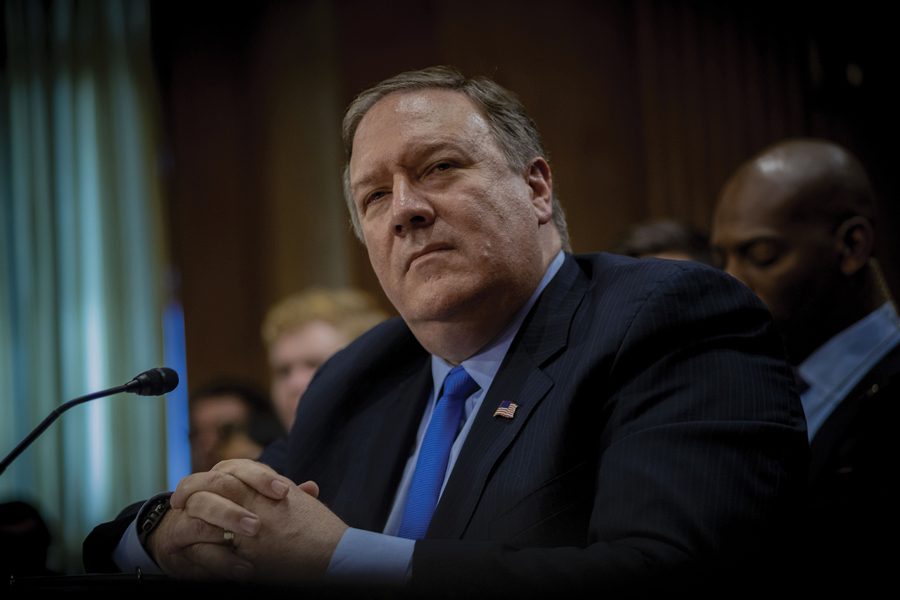With international students facing more restrictions, Northwestern seeks to increase support
(Olivier Douliery/Abaca Press/TNS)
Mike Pompeo, Secretary of State, has overseen President Trump’s national security strategy including restrictions on student visas for Chinese nationals. Northwestern’s International Office has sought to increase support for international students.
October 4, 2018
As international students at Northwestern continue to face uncertainties and obstacles spawned by stricter immigration policies, Northwestern is revamping efforts to support students facing the restrictions.
The new initiatives include legal support for international students like immigration attorneys who facilitate the re-entry of students and faculty from a list of banned countries, said Ravi Shankar, the director of the International Office.
“There was a Ph.D. student from Syria who grew up in Lebanon and never lived in Syria, but was denied a visa because Syrians don’t get a discretionary waiver,” Shankar said.
Working from NU’s Office of Government Relations, Shankar said a congressional inquiry took place and U.S. Rep. Jan Schakowsky (D-Ill.) was able to contact the U.S. embassy in Lebanon, which eventually granted the Syrian student a visa that allowed him to return to campus for his graduate education.
President Trump’s travel ban, which was upheld by the Supreme Court in a 5-to-4 decision in June, limits travel to the U.S. from a number of countries, primarily Muslim-majority ones. Since the ruling, the ban, originally deemed unconstitutional by some lower courts, has made it increasingly difficult for students from abroad to study in American schools.
In response, the University has added services and programs to support international students in a long-term battle to stay in the United States.
Shankar said he has initiated additional student support since the announcement of the travel ban’s first iteration in 2017. A committee was set up with administrators, including University President Morton Schapiro to predict impacts of the ban and form strategies to combat forces against international education since the beginning of the Trump administration, he said.
The University has been focused on providing increased advocacy on behalf of students affected by the ban, he said.
Amar Shabeeb, a Syrian-American, said the decision to uphold the ban was “upsetting” but unsurprising because it simply echoes discriminatory policies against Arabs and Muslims from the past.
“The people who suffer the most are the people who are already suffering—the people whose lives have already been put at risk,” the Weinberg sophomore said. “(The policy) is in line with our history, unfortunately.”
In May, the Trump administration also announced limits to Chinese graduate student visas, a decision targeting Chinese STEM students studying in high-tech fields like robotics, to ensure that intellectual property is not transferred back to China. Graduate students may be limited to one-year visas on a case-by-case basis.
The policy is a part of Trump’s larger National Security Strategy and started June 11. The White House was said to also have been considering a plan proposed by Stephen Miller, a senior adviser to the president, to ban all Chinese students, the Financial Times reported this month.
While no Chinese students have been affected by the new policy yet, “it’s just a wait-and-see game for what happens moving forward,” Shankar said.
Meanwhile, many of NU’s Chinese students have been feeling pressures from other restrictions that the Trump administration has put on Chinese nationals looking to study or work in the U.S.
Since Trump’s crackdown on U.S. immigration, more and more Chinese students’ applications for F1 student visas have been rejected. Haifei Zheng, a member of NU’s Chinese International Student Association, said several of his friends who have been admitted to U.S. universities could not obtain their student visas on time.
“Summertime is a climax for Chinese students applying for a visa,” the Medill sophomore said. “Some friends got rejected simply because the immigration department is asking for more clarifications, and you just have to wait in line again because there are so many other people waiting.”
Zheng said while there is no immediate stress for undergraduate students who already have a visa, many are limited in future job prospects because of changes to the H-1B working visa process.
Only 85,000 H-1B visas are granted each year using a lottery system, and international students who previously planned to earn some work experience after graduating from Northwestern are growing increasingly uncertain about whether U.S. policies will allow them to do so, Zheng said.
“For the student body, it’s not a immediate stress,” Zheng said, “but for international Chinese job-searching, we face more stress than Americans do. If we were U.S. students, we don’t need to worry about government issues and student visas.”
Email: amyli2021@u.northwestern.edu
Twitter: @amyhitsthebooks



